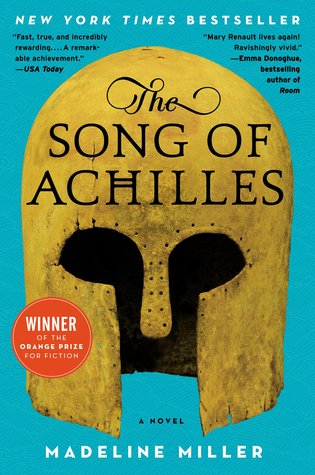Review: Madeline Miller’s “The Song of Achilles”
by Miles Raymer

The title of Madeline Miller’s retelling of The Iliad is a composite of two alternate names for the classic Greek poem: “The Anger of Achilles” and “The Song of Troy.” This careful bit of wordsmithing mirrors the nature of her project, for The Song of Achilles is a narrative blend of ancient traditions and modern values––a compassionate recasting of a war epic into a love story. This wonderful novel captured my affection from its opening lines and had its way with me right up to the final passage.
I’ll begin with some comments about Miller’s writing, which is generally excellent. Her combination of contemporary prose with the supernatural elements of Greek mythology makes the book feel like a work of magical realism, but somewhat “less random” since anyone with a basic knowledge of the source material will be familiar with the religious tropes and figures. In addition, The Song of Achilles is a masterclass in foreshadowing that will reward mythology nerds with sinister portents and satisfying allusions. Finally, Miller plays artfully with perspective and tense, starting with first person past tense and then switching to present tense at a key turning point toward the novel’s end. The overall result is a deftly-paced novel that builds tension better than most thrillers.
What kind of tension? Well, that changes as the novel progresses. In the beginning, the tension is all romantic. Miller chooses Patroclus as her narrator, so we meet him as a young boy and watch as he encounters and eventually befriends Achilles. These opening sections are full of lighthearted, sensual scenes in which Patroclus and Achilles slowly fall in love, discovering the delights of youthful companionship and lust. Miller’s appreciation for male beauty is truly captivating:
His beauty shown like a flame, vital and bright, drawing my eye against my will. His mouth was a plump bow, his nose an aristocratic arrow. When he was seated, his limbs did not skew as mine did, but arranged themselves with perfect grace, as if for a sculptor. Perhaps most remarkable was his unself-consciousness. He did not preen or pout as other handsome children did. Indeed, he seemed utterly unaware of his effect on the boys around him. (26)
As the flower of their adolescence begins to wilt, Patroclus and Achilles find themselves caught up in the Trojan War, and the tension shifts toward struggle and death. Achilles, the best fighter of his generation, decides to face his fate on the shores of Troy, and Patroclus cannot countenance being left behind. He then watches with growing dismay as his lover becomes an inimitable instrument of war. Sly and pragmatic Odysseus advises Patroclus to accept and even facilitate this inevitable shift:
If you are truly his friend, you will help him leave this soft heart behind. He’s going to Troy to kill men, not rescue them…He is a weapon, a killer. Do not forget it. You can use a spear as a walking stick, but that will not change its nature. (207)
So unmatched allure transforms into unrivaled violence, and Patroclus––no fighter himself––is left with the difficult task of trying to make the experience of war a bit less horrific for Achilles and his Myrmidons. He succeeds at this in part by developing a touching friendship with an enslaved Trojan woman named Briseis, a critical player in the dispute between Achilles and Agamemnon that kindles conflict in the original myth. We know how this ends, and it ends badly. But Miller has a few tricks up her sleeve to put her special spin on this tale, one of which brought me to tears. Once again, the words of Odysseus are helpful:
Fame is a strange thing. Some men gain glory after they die, while others fade. What is admired in one generation is abhorred in another…We cannot say who will survive the holocaust of memory. Who knows? (363-4)
Miller does justice to the themes of legacy, fate, pride, and honor that pervade The Iliad, but she also reveals how profoundly ugly and empty those concepts have become in our modern context. Nowhere is this more evident than in her poignant depiction of the famous exchange between Troy’s King Priam and Achilles in the aftermath of Hector’s death. Priam begs the vengeful hero to return Hector’s body so proper burial rites may be observed:
In grief, men must help each other, though they are enemies…It is right to seek peace for the dead. You and I both know there is no peace for those who live after. (349-50)
Here Miller invites us to contemplate and confront the atrocity of war––not only its innumerable tiny tragedies, but also its looming position in humanity’s history, present, and possible futures. We can sustain and extend our commitment to war, doubling down on a world where “there is no peace for those who live after,” or we can choose another path. Just as Achilles made his choice, we will make ours.
Rating: 9/10